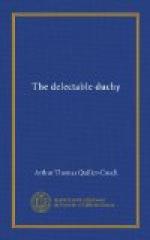None the less, I did my best: rowed him for a mile or two up the river; took him out to sea, and along the coast for half a dozen miles. The water was choppy, as it is under the slightest breeze from the south-east; and the Journalist was sea-sick; but seemed to mind this very little, and recovered sufficiently to ask my boatman two or three hundred questions before we reached the harbour again. Then we landed and explored the Church. This took us some time, owing to several freaks in its construction, for which I blessed the memory of its early-English builders. We went on to the Town Hall, the old Stannary Prison (now in ruins), the dilapidated Block-houses, the Battery. We traversed the town from end to end and studied the barge-boards and punkin-ends of every old house. I had meanly ordered that dinner should he ready half-an-hour earlier than usual, and, as it was, the objects of interest just lasted out.
As we sat and smoked our cigarettes after dinner, the Journalist said—
“If you don’t mind, I’ll he off in a few minutes and shut myself up in your study. I won’t he long turning out the copy; and after that I can talk to you without feeling I’ve neglected my work. There’s an early post here, I suppose?”
“Man alive!” said I, “you don’t mean to tell me that you’re working, this holiday?”
“Only a letter for the ‘Daily ——’ three times a week—a column and a half, or so.”
“The subject?”
“Oh, descriptive stuff about the places I’ve been visiting. I call it ‘An Idler in Lyonesse.’”
“Why Lyonesse?”
“Why not?”
“Well, Lyonesse has lain at the bottom of the Atlantic, between Land’s End and Scilly, these eight hundred years. The chroniclers relate that it was overwhelmed and lost in 1099, A.D. If your Constant Readers care to ramble there, they’re welcome, I’m sure.”
“I had thought” said he, “it was just a poet’s name for Cornwall. Well, never mind, I’ll go in presently and write up this place: it’s just as well to do it while one’s impressions are still fresh.”




